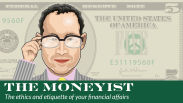You never really forget a truly exceptional salesperson.
Not only wouldn’t he take “no” for an answer, he wouldn’t even let the conversation get to “no.” More remarkably, you said “yes” and handed over your money feeling comfortable, not coerced.
Robert Cialdini knows a good sales pitch when he sees one. Cialdini, a social psychologist, is a leading expert on influence and its effect on behavior — why people are so easily led, and misled. His seminal best-selling book “Influence: The Psychology of Persuasion,” first published in 1984, is a classic of business literature. Now Cialdini is out with a new book, “Pre-Suasion: A Revolutionary Way to Influence and Persuade.”
In “Pre-Suasion,” Cialdini adds a seventh principle of persuasion to the six he described in his earlier book: unity. A pre-suasive encounter works like this: Make me feel that we are family — we are one together, cut from the same cloth. After you’ve made that connection, then make your request. Having been sufficiently pre-suaded, I likely will be more receptive to your product, politics or plan.
Cialdini cites several fascinating examples to illustrate pre-suasion in action, but one of the most remarkable is how Warren Buffett, the legendary investor and chairman and CEO of Berkshire Hathaway
BRK.A,
Read: 6 books that influence guru Robert Cialdini wants you to read
Why are people so geared to be pre-suaded, and how does Buffett demonstrate that in support of Berkshire Hathaway? Cialdini, who himself is a Berkshire shareholder, offered an explanation in a recent telephone interview, which has been edited for clarity:
MarketWatch: Pre-suasion is double-edged; a request can be well-meaning or manipulative. Warren Buffett is an artful influencer; so is convicted Wall Street con-man Bernie Madoff. One has created wealth for investors, the other destroyed it. Why is it so difficult to tell the difference?
Robert Cialdini: Principles of influence are hard-wired into us and lend themselves to assent. People will follow the presentation of oneself as an authority. We are hard-wired to react favorably to messages involving what genuine experts are telling us to do, what many others like us have done, and what opportunities are scarce, rare or dwindling in availability.
Three principles that Madoff used are three that any communicator will too. Warren and [business partner] Charlie [Munger] are being absolutely honest and ethical. They are genuinely honest and successful.
The first is the principle of authority. We prefer to say “yes” to a communicator who can give us information that knowledgeable authoritative experts are recommending that particular course of action.
Second is that people follow the lead of what multiple, comparable others are doing. For example, here’s how a restaurant owner can greatly increase the likelihood that customers will purchase items on the menu: star those items as the most popular dishes.
Third is scarcity. We want to seize those positive opportunities that are rare or dwindling in their availability. If a supermarket puts only “X per person [may be purchased]” in front of an array of items on the shelf, you more than double the purchasing. Anything that makes something seem less available to us causes us to want it more.
So if what many others like us are doing is clear, we’d be well-advised to follow their lead. If favorable opportunities are dwindling, we’d be well-advised to seize the opportunity. These principles steer us correctly most of the time.
MarketWatch: Warren Buffett’s annual shareholder letter is an opportunity for him to exercise influence. The letter’s tone is friendly and homespun, but Buffett takes it even further. He gives Berkshire shareholders the impression that he is actively looking out for their welfare.
Cialdini: Authenticity resonates for me in his pronouncements and statements. I recently read through 50 [years of Buffett’s] shareholder letters. The authenticity was always there. But he’s doing something in the last 20 years that I’ve recognized is an example of a guy who is both ethical and brilliant in the presentation of his authenticity. And that is, he almost invariably mentions a weakness or a drawback in the case he has to make for Berkshire Hathaway, and follows it with a strength.
That strategy of mentioning a weakness relatively early and following up with a strength builds on a strategy of creating a perception of trustworthiness.
He is willing to describe things that have gone wrong. The effect on me is disarming every time. I say: “These guys are being straight with me.” What’s the next thing? The next thing is a strength. I’m pre-suaded to be ready to believe this at a level that is deeper. What they do is to disarm us first so that we don’t put up any barriers.
I’ve taken a count of the number of times Warren uses this strategy over five decades. In the first 30 years, he used that strategy a total of seven times. In 1995 to 2004, he used it 10 times. In 2005 to 2014, he used it 16 times.
He’s learned how to do this. They [Buffett and Munger] read into human psychology. They read this literature and they’ve learned this is what you do — if you honestly have trustworthiness, then you’re wise to make it clear at the outset. Don’t paper it over; show people your trustworthiness.
MarketWatch: Have you noticed other distinct attempts at influence and pre-suasion in the Berkshire shareholder letter?
Cialdini: Here’s one other thing: For the last 30 years, Buffett has developed a convention of speech. He begins every report by making a statement regarding performance for the year. Two of those years, 2001 and 2008, were two of the most painful years in the history of the U.S. markets. In 2001, Buffett said Berkshire’s loss in net worth decreased the company’s book value. In 2008, he said something very similar. It’s the [report’s] first sentence: Our decrease in net worth.
Here’s the key: These are the only two years in which he italicizes loss vs. gain. He italicizes loss and decrease; he never italicizes gain or increase.
He’s drawing our attention to a loss or drop in value. What sense does that make? Any other CEO would do the opposite. But he’s drawing our attention to losses. The only sense that makes is that he recognizes that by drawing our attention to losses, he draws our attention to his trustworthiness. He gets us to pay attention to the next thing he’s going to say by showing us his credibility. We believe the next thing he’s going to say. He does that 26 separate times over the last two decades, from 1995 until now.
What I can say is that these guys — Buffett, along with Charlie Munger — are not just smart about investing. They’re smart about presenting the results of their investment success so that it encourages people to continue to want to hold Berkshire shares — and purchase new shares.
MarketWatch: Buffett’s Golden Anniversary letter in early 2015 tackled the sensitive, swirling issue of leadership succession. Buffett addressed concerns by outlining what he called “The next 50 years at Berkshire.” Given that he won’t be leading the company half-a-century from now, what language did he use that was so clearly pre-suasive?
Cialdini: For the Golden Anniversary letter he needed to do something especially powerful. Warren and Charlie are no spring chickens. What if either of them is no longer there? Is that going to cause a drop in my shares? If so, I would be well-advised to collect my astounding profits now.
That’s where Buffett does the thing I never heard or saw him do in any public forum. He invokes the concept of family. But first he says, of course I’ve been wrong many other times, but I’ll tell you something I would tell my family if they asked me if investing in Berkshire was a good idea.
This man had me at “family.” This is how he gets to be different. This guy keeps showing you his honesty first. Then you believe it. It’s not enough that he’s made this success; he’s got to get us to believe it will continue.
MarketWatch: Why do we connect so deeply with this concept of family?
Cialdini: Family fits into the seventh universal principle: unity — I am of you. If I am of you, then I of course want to give you the straight information because we are unified.
Family is the ultimate form of unity. We are indeed identical in some respects. We share fundamental genetic traits. I have a colleague who is a brilliant salesperson. When she’s on the phone with somebody who is dithering to say yes or no or they’ll check some other vendors for a better deal, she says: “I’ll tell you what I would say to you if you were my sister or my brother.”
It stops all dithering; this is what we do for family. That’s what Warren Buffett did in his Golden Anniversary letter: In the past 50 years I’ve been wrong many times, but I’ll tell you what I would say to my family if they asked me.
We’re hard-wired for it. The automatic response is to lend assent. We have to resist that. We have to step back and say “let me think about the price and the delivery date.” We have to step back and recalibrate.
Editor’s note: Jonathan Burton holds shares of Berkshire Hathaway Class B in a retirement account.







